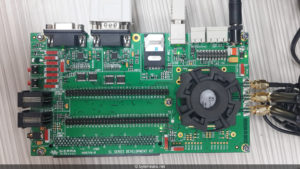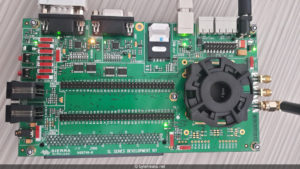Recently we tried to compile cisco-decrypt.c* on Fedora 24 (64bit).
We got the full source code from the website of Maurice Massar.
Download full source code here: [download id=”2078″]
We needed this tool to configure the Gnome 3 native network client to connect to a specific Cisco VPN network.
During the configuration we setup a “Cisco Compatible VPN (vpnc)” VPN.
* Please note that this tool is NOT a hacking nor cracking tool. In order for you to make any use of it, you need to have a valid PCF file given to you by your system administrator. It is only useful when you need to get the group password to configure a system that does not accept the PCF file with the encrypted password.
To compile the code you can use one of the following two methods:
Compilation method 1
gcc -Wall -o cisco-decrypt cisco-decrypt.c $(libgcrypt-config --libs --cflags)
If the package libgcrypt-devel is not installed you will get a prompt message as follows, which will instruct you to install the missing package.
You need to type y to both questions so that the installation will proceed. Once the installation is done, execute once more the compilation command.
As you can see below, you might get a whole bunch of errors, ignore them and try to compile once more. It seems to be a bug that will not affect the end result (at least in this scenario).
gcc -Wall -o cisco-decrypt cisco-decrypt.c $(libgcrypt-config --libs --cflags)
bash: libgcrypt-config: command not found...
Install package 'libgcrypt-devel' to provide command 'libgcrypt-config'? [N/y] y
Proceed with changes? [N/y] y
gcc: error: Waiting: No such file or directory
gcc: error: in: No such file or directory
gcc: error: queue...: No such file or directory
gcc: error: Loading: No such file or directory
gcc: error: list: No such file or directory
gcc: error: of: No such file or directory
gcc: error: packages....: No such file or directory
gcc: error: The: No such file or directory
gcc: error: following: No such file or directory
gcc: error: packages: No such file or directory
gcc: error: have: No such file or directory
gcc: error: to: No such file or directory
gcc: error: be: No such file or directory
gcc: error: installed:: No such file or directory
gcc: error: libgcrypt-devel-1.6.6-1.fc24.x86_64: No such file or directory
gcc: error: Development: No such file or directory
gcc: error: files: No such file or directory
gcc: error: for: No such file or directory
gcc: error: the: No such file or directory
gcc: error: libgcrypt: No such file or directory
gcc: error: package: No such file or directory
gcc: error: libgpg-error-devel-1.24-1.fc24.x86_64: No such file or directory
gcc: error: Development: No such file or directory
gcc: error: files: No such file or directory
gcc: error: for: No such file or directory
gcc: error: the: No such file or directory
gcc: error: libgpg-error: No such file or directory
gcc: error: package: No such file or directory
gcc: error: Waiting: No such file or directory
gcc: error: in: No such file or directory
gcc: error: queue...: No such file or directory
gcc: error: Waiting: No such file or directory
gcc: error: for: No such file or directory
gcc: error: authentication...: No such file or directory
gcc: error: Waiting: No such file or directory
gcc: error: in: No such file or directory
gcc: error: queue...: No such file or directory
gcc: error: Downloading: No such file or directory
gcc: error: packages...: No such file or directory
gcc: error: Requesting: No such file or directory
gcc: error: data...: No such file or directory
gcc: error: Testing: No such file or directory
gcc: error: changes...: No such file or directory
gcc: error: Installing: No such file or directory
gcc: error: packages...: No such file or directory
Compilation method 2
In case the above method does not work for you for some reason, you can try the following.
gcc -Wall -o cisco-decrypt cisco-decrypt.c -lgcrypt
If the package libgcrypt-devel is not installed you will get an error as follows.
gcc -Wall -o cisco-decrypt cisco-decrypt.c -lgcrypt
cisco-decrypt.c:30:20: fatal error: gcrypt.h: No such file or directory
#include <gcrypt.h>
^
compilation terminated.
In this case use
sudo dnf install libgcrypt-devel
to install the missing library and try again to compile.
To use
Open your PCF file with a text editor. Find the line that starts with enc_GroupPwd= and copy the characters after that.
Paste the characters as the first command line argument to the newly compiled application. The password will be the line returned right after.
./cisco-decrypt 886E2FC74BFCD8B6FAF47784C386A50D0C1A5D0528D1E682B7EBAB6B2E91E792E389914767193F9114FA26C1E192034754F85FC97ED36509
Th!sIsMyK3y#
Other notes
In the case you get these errors:
/tmp/ccHrH1kZ.o: In function `c_decrypt':
cisco-decrypt.c:(.text+0x243): undefined reference to `gcry_md_hash_buffer'
cisco-decrypt.c:(.text+0x267): undefined reference to `gcry_md_hash_buffer'
cisco-decrypt.c:(.text+0x2b4): undefined reference to `gcry_md_hash_buffer'
cisco-decrypt.c:(.text+0x31d): undefined reference to `gcry_cipher_open'
cisco-decrypt.c:(.text+0x33b): undefined reference to `gcry_cipher_setkey'
cisco-decrypt.c:(.text+0x356): undefined reference to `gcry_cipher_setiv'
cisco-decrypt.c:(.text+0x382): undefined reference to `gcry_cipher_decrypt'
cisco-decrypt.c:(.text+0x391): undefined reference to `gcry_cipher_close'
/tmp/ccHrH1kZ.o: In function `main':
cisco-decrypt.c:(.text+0x41e): undefined reference to `gcry_check_version'
collect2: error: ld returned 1 exit status
It most probably means that you did not add on your compilation command one of the following two parameters
- $(libgcrypt-config –libs –cflags)
- -lgcrypt
You need one of these two options to be on the command line to compile.






